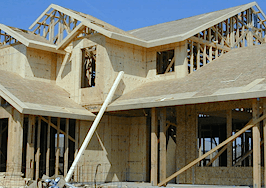Last month the U.S. Census Bureau and the U.S. Department of Housing and Urban Development reported that new single-family home sales dropped 7.8 percent month-over-month nationwide in January, with the Northeast, Midwest and South experiencing double-digit sales declines, a disappointing piece of news after a few solid months of new residential construction.
But John Burns Real Estate Consulting director of research Rick Palacios Jr. says even though he saw plenty of industry professionals sharing the report and expressing concerns about the decline in new-home sales in both January and December, now is actually not the time to worry. In fact, he says new-home sales are on the rise, at least according to the firm’s own research that involves surveying 300 builders every month that account for approximately 17 percent of the nation’s new-home sales.
“I suppose we should thank the Census Bureau for publishing incorrect conclusions and footnoting a 19 percent +/- margin of error,” he wrote in an e-mailed report. “However, it gives our clients heartburn. Our clients pay us to be right — not to be overly bullish or bearish.” (The Census Bureau does include the margin of error in the body copy of the report, in parenthesis behind the percent increase or decline, as shown below):

Palacios said journalists (including me) write articles based on this report and forget to mention the margin of error, which changes the way a stat should be read, interpreted and used.
“In theory, if they said sales were flat in January, and their margin of error was plus or minus 20 percent, then basically they’re saying sales could have risen 20 percent or fallen 20 percent,” Palacios told Inman. “In a nutshell, the Census can’t tell you if home sales fell or rose last month.”
Palacios says the high margin of error from the U.S. Census Bureau is the result of large sample variations, and reports with controlled samples offer more accurate and reliable results.
Palacios and his team survey the same 300+ homebuilders each month who account for approximately 17 percent of all new home sales. According to their research, new home sales rose 20 percent month-over-month and 14 percent year-over-year. Furthermore, he says public homebuilder earnings calls revealed a strong Q4 and a robust Q1 thus far.

Public homebuilder earnings call comments.
“I’ve heard from so many of our clients on the homebuilding side that the Census numbers absolutely made no sense because everything they’re seeing in their markets points the opposite way,” he said.
Palacios says real estate professionals don’t have to disregard the U.S. Census Bureau’s new home sales report totally, but it helps to read each report with a critical eye.
“I think you should read every statistical release with a grain of salt,” he said. “A knee-jerk reaction to a headline, in our opinion, is the worst thing to do.”
When reading a report, Palacios says it’s important to remember that one “bad” month shouldn’t cause alarm. It takes anywhere from three to six months for a trend to emerge, so only begin to worry if new home sales are still declining in June.
Next, he advises real estate professionals to adopt what the John Burns’ team calls “second-level thinking” when dissecting a new stat.
For example, most people’s “first-level” thinking had them believing the uptick in mortgage rates meant they needed to begin preparing for the worst. But, “second-level” thinking would have led them to think about the context of the rate hike. Is it due to positive factors, such as a strong economy, wage growth, a healthy stock market and rising consumer confidence? If so, the rise in mortgage rates is nothing to fuss over.
“Think through the noise,” he said.









